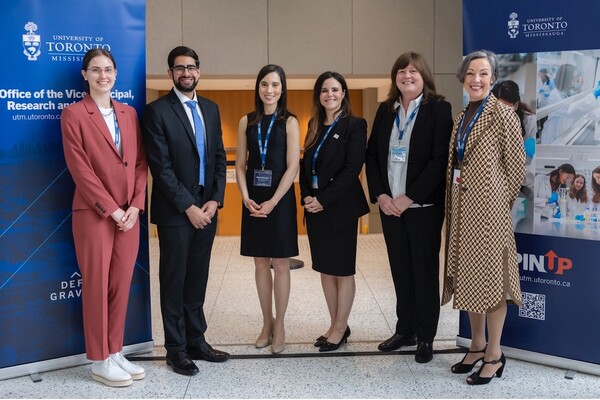Breadcrumbs
- Home
- About the Centre
- News
- Tanz Centre awards to support three researchers exploring brain diseases
Tanz Centre awards to support three researchers exploring brain diseases

Three scientists at the Tanz Centre for Research in Neurodegenerative Diseases have received awards to support their research and develop leading-edge treatments.
Each $40,000 award supports projects that aim to improve care for patients with neurodegenerative diseases. One study aims to understand environmental factors that may contribute to the development of amyotrophic lateral sclerosis (ALS), while the two others take different approaches to immunotherapy for Parkinson’s disease.
“These awards, which are made possible through generous endowed donations, enable cutting-edge research to be performed more rapidly and effectively, ultimately benefitting all of society,” says Graham Collingridge, director of the Tanz Centre.
Robert L. Cunningham Parkinson’s Research Award
Anurag Tandon, associate professor at the University of Toronto’s Temerty Faculty of Medicine and principal investigator at the Tanz Centre, received the Robert L. Cunningham Parkinson’s Research Award to support development of new immunotherapy for Parkinson’s disease and to investigate whether it can be delivered through gene therapy.
The award is made possible through a bequest from the estate of Robert Cunningham.
Tandon’s team has been developing gene therapy for Parkinson’s disease through either reducing expression of a gene that leads to the disease or introducing a genetic sequence that allows the body to continuously produce its own immunotherapy.
The Cunningham award will support their research into nanobodies, which are small fragments of immune-system antibodies. While antibodies typically target and eliminate bacteria and viruses, the nanobodies from Tandon’s lab target toxic proteins such as misfolded alpha synuclein, which accumulates in brain cells of people with Parkinson’s disease and contributes to neurodegeneration.
Because of their small size, nanobodies can penetrate the brain to find and destroy misfolded alpha synuclein protein. These nanobodies also have potential to be delivered through gene therapy, which could result in a long-lasting therapeutic effects.
“Our goal for these studies is to enable affected neurons in individuals with Parkinson’s disease to generate their own therapeutic nanobodies that will target and safely remove the toxic disease proteins,” says Tandon. “We thank the Cunningham family for supporting this research.”
Laura Sabia Parkinson Research Award
Martin Ingelsson, clinician-scientist in the Krembil Brain Institute at University Health Network and principal investigator at the Tanz Centre, received the Laura Sabia Parkinson Research Award to support development of an immunotherapy that targets misfolded alpha synuclein protein in Parkinson’s disease.
The award is funded by the Laura Sabia Fund at Parkinson Canada.
Ingelsson’s team previously generated a monoclonal antibody (immune system protein) that could target one form of misfolded alpha synuclein protein and was shown to slow the disease and reduce symptoms in animal models of Parkinson’s disease.
With the Laura Sabia Parkinson Research Award, the team is expanding on this research. They will use samples from post-mortem brains donated by people with Parkinson’s disease and other neurodegenerative disorders to develop additional monoclonal antibodies for particular forms of misfolded alpha synuclein. As a next step, they will evaluate whether these monoclonal antibodies can prevent or reduce the growth and spread of alpha synuclein in cell and animal models.
If successful, the project could result in new immunotherapies tailored to treat a variety of alpha synuclein–related neurodegenerative disorders, including Parkinson’s disease, Lewy Body dementia and multiple system atrophy. The techniques could also be used to develop immunotherapies for neurodegenerative diseases caused by other misfolded proteins.
“We hope that antibodies created in this way will be more effective for the treatment of these disorders compared to those currently being used and evaluated,” says Ingelsson. “I am very grateful for the grant received from the Laura Sabia Parkinson’s Research Fund, as it will allow us to reach our goals faster.”
Kofman Family Memorial Research Award
Janice Robertson, professor in the department of laboratory medicine and pathobiology at Temerty Medicine, and James Hunter Family Chair in Amyotrophic Lateral Sclerosis (ALS) Research at the Tanz Centre, received the Kofman Family Memorial Research Award to investigate whether environmental factors contribute to development of ALS.
The Kofman Family Memorial Research Award is supported by a gift from Tom and Karen Kofman.
ALS is a devastating neurodegenerative disease caused by the loss of motor neurons from the brain and spinal cord, resulting in progressive paralysis and death within a few years of diagnosis. The most common genetic cause of ALS is a mutation in a gene called C9orf72, but recent studies have shown that less than one third of individuals with this mutation develop ALS. This suggests that there must be other factors involved in the development of disease.
Through the Kofman Family Memorial Award, Robertson will investigate if environmental factors can trigger ALS and how C9orf72 mutations predispose brain cells to the effects of environmental toxins. A better understanding of the role of environment in ALS development will help researchers to develop early interventions to prevent ALS.
“Studies from our lab using mouse models have shown that C9orf72 mutations cause instability in how the brain is wired. Under normal conditions, the brain can function well with this mutation, but if exposed to a ‘second hit’ such as an environmental factor, this stability is lost, and disease ensues,” says Robertson.
“We are very grateful to the Kofman Family for this award so that we can better understand the factors causing ALS and help design effective strategies to end this horrifying disease.”
News



